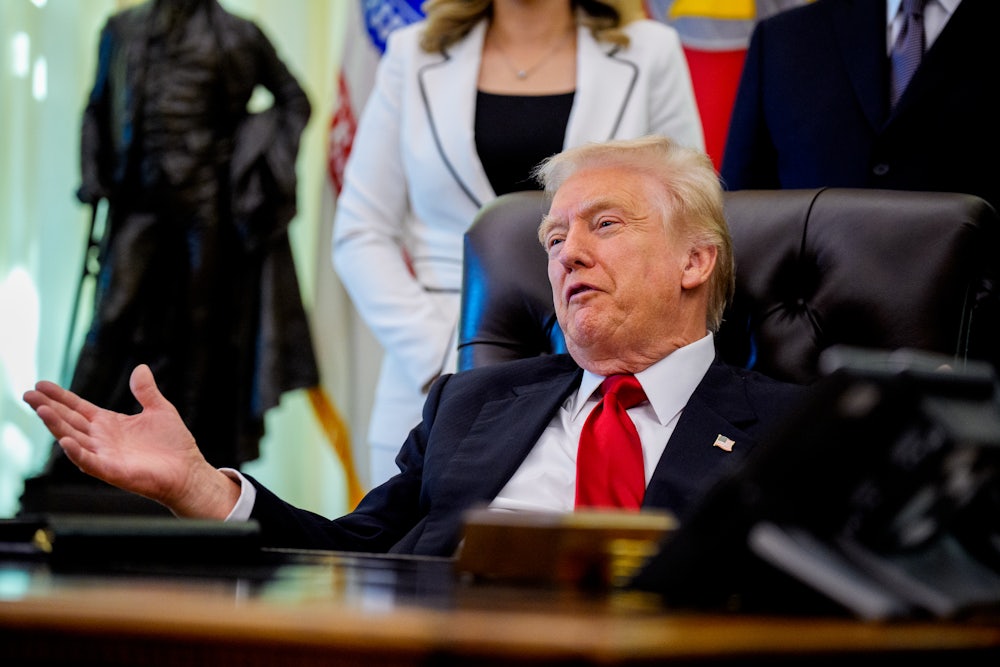On Wednesday, Donald Trump finally seemed to wake up. Republicans everywhere had just gotten demolished in off-year elections, from gubernatorial races in New Jersey and Virginia to downballot races in Georgia and Pennsylvania. The president told Senate Republicans that the government shutdown was “worse for us than for them”—meaning the Democrats—and that they were at risk of being a “dead party” if they didn’t nuke the filibuster to reopen the government.
Trump is right: The shutdown has been a political disaster for the Republicans, who are receiving the lion’s share of blame in public opinion polls. But Senate Republicans are not going to nuke the filibuster—at least not yet, and probably not ever. At the same time, their negotiating position has just been weakened by an electoral wipeout. So the administration is now desperate to try anything to turn the tables on Democrats.
Here is how that’s going so far: Transportation Secretary Sean Duffy, not long after Trump finished berating his fellow Republicans, announced that he would be ordering 40 of the busiest airports in the country to start canceling flights—thousands of them—starting on Friday. The former Real World cast member insists the move is necessary to “alleviate the pressure” on air traffic controllers, who have been working without pay amid the shutdown. But as The New York Times reported, flight interruptions “have been comparatively benign” this week after the delays over Halloween weekend. Duffy warned of “mass chaos” earlier this week, and now he’s going to deliver it—right as we head into the busiest travel season of the year.
It’s a revealing move. This administration can only think in political terms. Trump and his lackeys aren’t worried about the human costs of the shutdown, just ways to increase political pressure. This is consistent with how Trump operates in general. As we’ve seen in so many respects—from tariffs to DOGE to ICE—he only knows how to destroy stuff, whether it be federal agencies, American business, or livelihoods. So faced with a painful, destructive shutdown, the administration responds with yet more pain and destruction.
If Duffy’s goal is to increase pressure on Democrats to vote to reopen the government without winning any of the concessions they’re seeking—namely the return of Covid-era Obamacare subsidies that expire at year’s end—it’s hard to see how it could possibly succeed. Voters have consistently blamed Republicans for the shutdown since it began over a month ago, and that’s not going to change with headlines like this: “Trump Officials to Cut Air Traffic at 40 Major Airports if Shutdown Continues.” Why would increasing the chaos and suffering caused by the shutdown do anything to change an environment that already favors Democrats politically?
Instead, it’s just the latest example of a long-standing approach to governance on the right. Near the end of Trump’s first term, the president and his party shut down the government for over a month in a futile attempt to pressure Democrats to provide more funding for a border wall—increasing suffering in the hopes of achieving a policy goal whose utility was largely symbolic. It didn’t work then because it never does. But that’s all Republicans really have to offer.
In the case of the flight cancellations, Duffy and others in the Trump administration likely believe that making the shutdown worse will force the Democrats to fold, for a simple reason: The Democrats are the only ones who are actually interested in functional governance and in minimizing Americans’ pain and misery. As with expiring SNAP benefits that are causing millions of households to flood food banks, Republicans hope that Democrats will come to the table and drop their demands solely out of their solemn duty to keep the government operational—even if it is being operated by people who view most of the country with contempt, or worse.
Whether in the White House or outside of it, Democrats have often yielded to this kind of hostage-taking. During a number of previous government shutdowns, they negotiated in good faith with a Republican Party that was off the rails long before Trump arrived on the scene. In these instances, the Democrats have almost always been negotiating against themselves, dropping demands and doing little with their political leverage in part because they were the only people who were concerned about the damage caused by a shuttered government.
Even now, one could argue the Democratic Party hasn’t done enough with a politically advantageous situation. Voters truly hate Trump right now—for failing to lower prices, for terrorizing communities with his masked gestapo, and so much more. His disapproval rating in a CNN poll this week hit a record 62 percent—one point higher than the same poll taken right after the January 6 insurrection.
Democrats could have used this political climate to really push back on Trump’s tariffs, which are driving inflation, or to curtail Trump’s deportation machine. But Democrats have held fast to their current negotiating position, insisting that they will open the government only for the low price of restoring subsidies that have been in place for years. After Tuesday’s results, which may well be a preview of a blue wave that will hit in a year’s time, Democrats should feel confident to sit back and wait for Republicans to cave for once. Some 20 million Americans will thank them for standing firm—and probably will reward them next fall.






